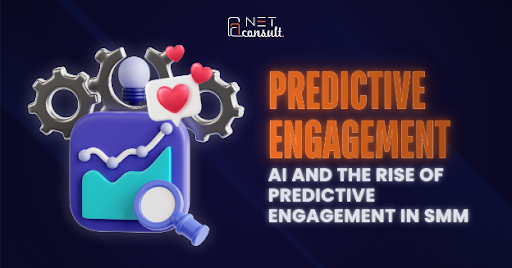In today’s hyperconnected world, social media is no longer a unidirectional broadcasting system — it’s a battle for attention, loyalty, and influence. With ever-more dynamic user behavior and fewer predictable patterns, old engagement strategies no longer hold.
That’s where predictive engagement comes into the picture, with the advantage of artificial intelligence (AI) in its center. The new era of social media marketing (SMM) enables brands to foretell user requirements, personalize interaction, and dynamically optimize content delivery in real time.
In this blog, we explain how AI is not just enhancing SMM — it’s revolutionizing it by converting data into foresight, and engagement into quantifiable, predictive outcomes.
What specific AI tools or platforms are most effective for marketing automation?
In the realm of predictive social media marketing (SMM), some of the top AI tools include automation platforms that provide real-time behavior insights. HubSpot, Lately.ai, and Sprinklr apply machine learning to analyze past audience behavior and determine the best times to post, tone, and style of content to elicit engagement.
Emplifi and Hootsuite Insights employ predictive analysis to forecast the next best action by audience sentiment and engagement trends. Persado and Copy.ai employ generative AI to develop high-converting captions and call-to-actions based on audience emotion and engagement trends.
These aren’t just automating—these are employing AI to predict what content will perform best prior to publishing, and that makes them an absolute requirement for any brand committed to keeping up with the AI-powered social media game. In the context of UAE SMEs and investors, understanding which platform or tool is crucial for your business is mandatory. In this case, a digital marketing company in UAE can help through their premium services.
How can small businesses with limited resources implement AI-driven marketing automation?
UAE Small and medium enterprises (SMEs) can utilize AI-based marketing automation for predictive social media marketing (SMM) engagement. Cost-effective AI schedulers, audience segmentation tools, and engagement predictors enable content delivery and personalized interaction automation.
Predictive analytics come with most platforms, recommending best-post times, recognizing high-engagement content, and predicting trends without a data science team. Low-cost or free AI integrations such as Meta Business Suite or Buffer can be utilized by SMEs to experiment with strategies and scale up as performance improves.
An efficient social media marketing company in Dubai would ensure that this predictive engagement access puts the playing field on a level ground your brand to match up with big companies, optimizing operations in a shifting social landscape.
What are the potential risks or challenges associated with AI in marketing automation?
This table shows which risk factors associated with AI in marketing automation:
| Risk Area | Description | Impact | Recommended Solution |
| Over-Personalization | Excessive content targeting can feel invasive or manipulative to users. | User disengagement and drop in satisfaction | Maintain a balance between personalization and relevance. |
| Bias in Algorithms | Predictive models may reinforce existing biases due to flawed or non-representative training data. | Misinformation and audience alienation | Audit training data regularly and apply fairness constraints. |
| Generic/ Unpersonalized Responses | AI-generated messages can lack human nuance, making brand voice feel robotic or disconnected. | Weakened brand perception and engagement | Use hybrid models with human review for tone and context. |
| Erosion of Brand Trust | Poorly managed AI engagement strategies can lead to transparency issues and user backlash. | Long-term trust and loyalty loss | Be transparent about AI use and give users control. |
| Over-Reliance on Automation | Fully automated systems may overlook emotional cues, cultural context, or trending shifts. | Missed engagement opportunities | Combine AI automation with human oversight and strategy. |
What are the most effective ROI metrics for measuring AI-powered social media marketing performance?
To gauge the ROI of AI-based predictive engagement in social media advertising, the old-fashioned metrics of impressions or clicks won’t do. Instead, marketers must monitor predictive engagement KPIs such as AI-personalized content conversion lift, engagement rate attributed to dynamic audience segments, cost per predictive conversion, and time-to-conversion. These metrics speak directly to how well AI can predict user behavior and intent—finally proving its effect on campaign efficiency as well as business outcomes in a competitive digital world.
How does AI in marketing automation affect customer trust and brand perception?
Predictive engagement AI both builds or ruins customer trust. AI used appropriately, re-affirms brand equity with highly personal content and intelligent responses. The opposite holds, however, when individuals feel that they’re being manipulated through content or confronted by a “machine-first” solution: there’ll be an absence of trust. Transparency and ethically-conceived personalization are paramount when creating brand relations on social media using predictive engagement.
How does AI-driven marketing automation adapt to rapidly changing market trends and consumer behaviors?
AI’s greatest asset in predictive SMM is real-time adaptation. Static approaches can’t compete with AI in examining shifts in consumer behavior—like popular hashtags or dips in engagement—and rapidly adapting campaigns. This adaptability allows brands to react to cultural changes and demand spikes well, optimizing engagement. Predictive AI anticipates rather than observes, having the power to give a competitive edge in the rapidly changing digital landscape.
How can SMEs effectively implement AI in their social media marketing strategies?
SMEs can deploy AI on social media marketing in a low-key manner by beginning with solutions that deliver tangible value, for instance, AI schedulers, chatbots, and sentiment analysis solutions. They automate posting and responding to FAQs while providing insights into audience behavior. For predictive engagement, SMEs must aim for platforms offering audience segmentation, content forecasting, and personalization. Integration of these tools in CRMs available enables effortless utilization of data as well as customization of content. Most importantly, SMEs must choose scalable and affordable AI solutions with minimal technical installation, which enable them to rival big brands without compromising control of messaging.
What are the best practices for ensuring data privacy and compliance when using AI in social media marketing?
Collecting only necessary data for the optimization of engagement and for transparency to users regarding the usage of their data—ideally through new privacy policies and consent processes—are mandatory. Frequent audits and risk assessments must be performed to analyze how user data is handled by AI systems and maintain compliance with local and international laws on a continuous basis. Role-based access control, ethics-based data usage training for marketing teams, and refraining from using AI output that profiles users in discriminatory or manipulative manners are also suggested. Finally, respect for user autonomy and transparency are paramount in establishing trust when tapping the power of AI-based predictive engagement.
What strategies can be employed to mitigate algorithmic bias in AI-driven social media marketing?
To minimize algorithmic bias in AI social media marketing, companies need to examine their training data for diversity, covering more than one group and behavior. Bias is caused by incomplete data sets, so working with inclusive, up-to-date data is necessary. Marketers need to work with data scientists to establish fairness goals and audit AI output for biased targeting or exclusion. Working with explainable AI models can make decision-making transparent and eliminate unintended biases. Human monitoring, reviewing AI-generated content before publication, is another approach. Companies need to listen to audience feedback to refine and improve fairness and inclusivity.
How does AI influence content creation and curation processes in social media marketing?
AI dramatically changes the way any social media marketing agency now creates content. For creation, AI programs can create captions, headlines, visual arrangements, and even complete posts from trending keywords, audience behaviors, or best practices for a specific platform—allowing marketers to produce more without going out of date.
On the curation side, AI looks at user engagement metrics to decide what content performs well for specific segments, allowing marketers to target and publish the best-performing or timely content.
Predictive analytics also assist in publishing content when users are most engaged and provide variations depending on different platforms. This not only boosts engagement but also decreases creative guesswork, making social plans more data-driven and in-tune with trending behaviors. UAE businesses can leverage services of a content marketing agency in Dubai to recycle content and target different audiences.
What are the challenges and best practices for integrating AI tools into existing marketing and social media systems?
Here’s the table outlining the key challenges and solutions for integrating AI platforms into existing marketing systems.
| AI Integration Challenge | Recommended Solution |
| Data incompatibility with existing systems | Adopt modular, API-friendly AI platforms |
| Lack of internal AI expertise | Provide AI literacy and workflow training |
| Fragmentation of marketing and social platforms | Choose platforms that unify cross-channel functions |
| Resistance to digital transformation | Start with phased AI pilot programs |
| Siloed data across CRMs, CMSs, and schedulers | Standardize data formats across systems |
| Employees unable to interpret AI outputs | Empower teams with cross-functional collaboration |
What are the limitations of AI in understanding human emotion and cultural nuance on social platforms?
Where AI excels at pattern recognition and broad sentiment analysis, it struggles with the subtlety of human emotion, sarcasm, and culturally relative language on social media. As a risk in SMM predictive engagement, this is misinterpreting user intent, tone, or cultural context—leading to tone-deaf or bland presentation of content. For UAE brands engaging with culturally diverse communities, this liability requires predictive models to be augmented with human interaction to offer authenticity and context.
Conclusion
In the fast-paced world of social media marketing, predictive engagement via AI is no longer a sci-fi fantasy — it’s a reality. From real-time optimization to trend-defying, to personalized content automation, AI allows brands to predict, not react.
When used responsibly, predictive analytics can foster trust by balancing user behavior, cultural sensitivity, and privacy levels — most prominently in advanced markets like the UAE.
But to tap into the full potential of AI, brands must balance automation with ethical guidance and creative strategy. For the best-performing campaigns, where data and empathy meet, AI will be a wise co-pilot, not a human marketer substitute, in driving effective, measurable engagement.



